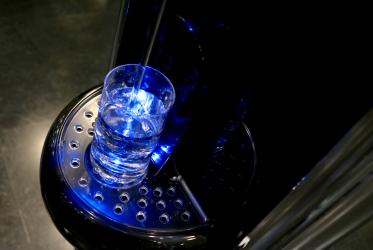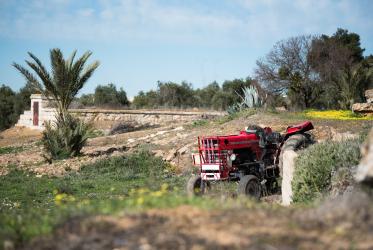Meditation by the Rev. Dr Olav Fykse Tveit, general secretary of the World Council of Churches (WCC) at the Uniting General Council of the World Communion of Reformed Churches, Calvin College, Grand Rapids
Morning Worship Monday, 21 June 2010
1 You were dead through the trespasses and sins 2 in which you once lived, following the course of this world, following the ruler of the power of the air, the spirit that is now at work among those who are disobedient.
3 All of us once lived among them in the passions of our flesh, following the desires of flesh and senses, and we were by nature children of wrath, like everyone else.
4 But God, who is rich in mercy, out of the great love with which he loved us 5 even when we were dead through our trespasses, made us alive together with Christ - by grace you have been saved - 6 and raised us up with him and seated us with him in the heavenly places in Christ Jesus, 7 so that in the ages to come he might show the immeasurable riches of his grace in kindness towards us in Christ Jesus.
8 For by grace you have been saved through faith, and this is not your own doing; it is the gift of God - 9 not the result of works, so that no one may boast.
10 For we are what he has made us, created in Christ Jesus for good works, which God prepared beforehand to be our way of life.
Ephesians 2.1-10 (NRSV)
The words of the theme of your general council from Ephesians chapter 4 - "Unity of the Spirit in the Bond of Peace" - presuppose these words from chapter 2.
The bonds of peace presuppose the bonds of baptism. Baptism is the source of our life together.
In the Faith and Order document Baptism, Eucharist and Ministry (BEM) from 1982, one of the most significant texts from the ecumenical movement, we read (B.6):
Through baptism, Christians are brought into union with Christ, with each other and with the Church of every time and place. Our common baptism, which unites us to Christ in faith, is thus a basic bond of unity. We are one people and are called to confess and serve one Lord in each place and in all the world.
The words we have just heard from Holy Scripture are a strong echo of the liturgy of baptism in the early church; words which accompanied those going down the steps to a river or into a baptistry and then mounting the steps again to a new life.
You were dead
We were dead
God made us alive
Together
With Christ
By grace through faith
It is the gift of God
Created for good works
The whole of the letter to the Ephesians has at its aim to strengthen that life together which is so wonderfully described as "the bonds of peace". These bonds of peace are not always clear to see, neither in the context of the deep differences about Jewish or Gentile identity in the church in Ephesus, nor in other local or global communions of baptized human beings with many different identities. The bonds of peace are something the church struggles with and will continue to struggle with.
Communion needs more than superficial words. There is a need for words that address reality in a way that can also transform it. We need to confess our sins together. Our way of defining reality must be honest, something that we acknowledge, something that we can believe in, be challenged by – and still be who we are created to be. The call to baptism is not about illusions or the manipulation of identities.
The way towards peace requires honest and clear words.
“You were dead.” “You were dead through the trespasses and sins in which you once lived.” The "others", “the Gentiles” who through their baptism and faith had become part of the household of God, did not and do not have a preferential position. “You were dead.” There could hardly be a more critical description of reality. There are always reasons to make the past looking nicer than it is. There are times for clear, critical words.
But such words cannot stand alone. Not even when they are completely correct. To focus merely on the mistakes or trespasses of others creates even more self-defensive frustration, more hostility that blocks, more destructive death. Something more is needed. We need not only the water of baptism to wash away our sins; we also need it to nurture life.
The way towards peace requires inclusive words. The problem is not only with the "other". The text says, “All of us once lived among them in the passions of our flesh”. The older sisters and brothers in the household of God, those who received the promises of salvation first, should not forget their own sinful actions. There is a need for the solidarity of self-criticism in all peace-making and all peace-keeping. No criticism is able to create life-giving changes unless it is given in solidarity, so that it can be transformed into self-criticism. We all have something to be accountable for. Those who talk only about the faults of others tend to make me suspicious. Have they really understood who they are themselves? The transformative power of life-giving change is destroyed when we play the game of looking for scapegoats. That game is over. This is what is said later in verses 14-16: “He (Christ) is our peace, who has made us both one […] that he might reconcile us both to God in one body through the cross, thereby bringing the hostility to an end.”
The way towards peace requires words of thankfulness. We need words that recognize that the most significant things are those that have been given to us. Such thankfulness is much more than mere confirmation of what we have received. Words of thanks are words of praise to God who is rich in mercy. Words of thankfulness express that we know that we need this gift, that we receive it and make it our own, that the source of life and joy come from beyond ourselves. Only this can unite us, again and again. To remember our baptism is first and foremost to give thanks together.
The way towards peace requires words of faith. We need the common baptismal confession to God. We need to confess the same faith in our creator, our saviour and our life-giver. Words about ourselves - as individuals or as different groups with a common identity - are not enough, however honest and inclusive they may be. We need words about God, God who is rich in mercy. Theology is more than reflection, it is doxology, praise to God. A theology of baptism must speak the truth about life and offer glory to God. In baptism God gave us the riches of his grace in kindness towards us in Christ Jesus.
The way towards peace requires words of action. Baptism is an action of God. The spring of living water is created by God. When I was baptized, my mother had to carry me to the baptismal font. Later at Sunday school some of these verses from Ephesians 2 were the first verses from the Bible that I had to learn by heart, part of my catechism. They are verses which provide us with a deep echo of the Early Church's liturgy of baptism, of being one with Christ. Whether we are carried by our parents to the font or ask for baptism as adults, baptism, my baptism and your baptism is always the action of God, by water and the word, by water and the Spirit. As at the beginning, God's words are creative, living words; God “made us alive together with Christ”.
Baptism calls us to act. Baptism calls us to be peacemakers. As verse 10 says: "We are created in Christ Jesus for good works". The way towards peace needs the creative, transformative words of God, working in our baptism through the water, word and Spirit. On the day of our baptism and every day that we live as baptized people. “You are made alive together with Christ.” (v.5) The way we define reality shapes reality.
So sisters and brothers, let us in gratitude repeat the words that were said at our baptism, our common baptism in the bond of peace.
May God continue to transform and teach us the ways of peace, leading us every day to the spring of living water, as one people called to confess and serve one Lord in each place and in the whole the world.
Amen.




